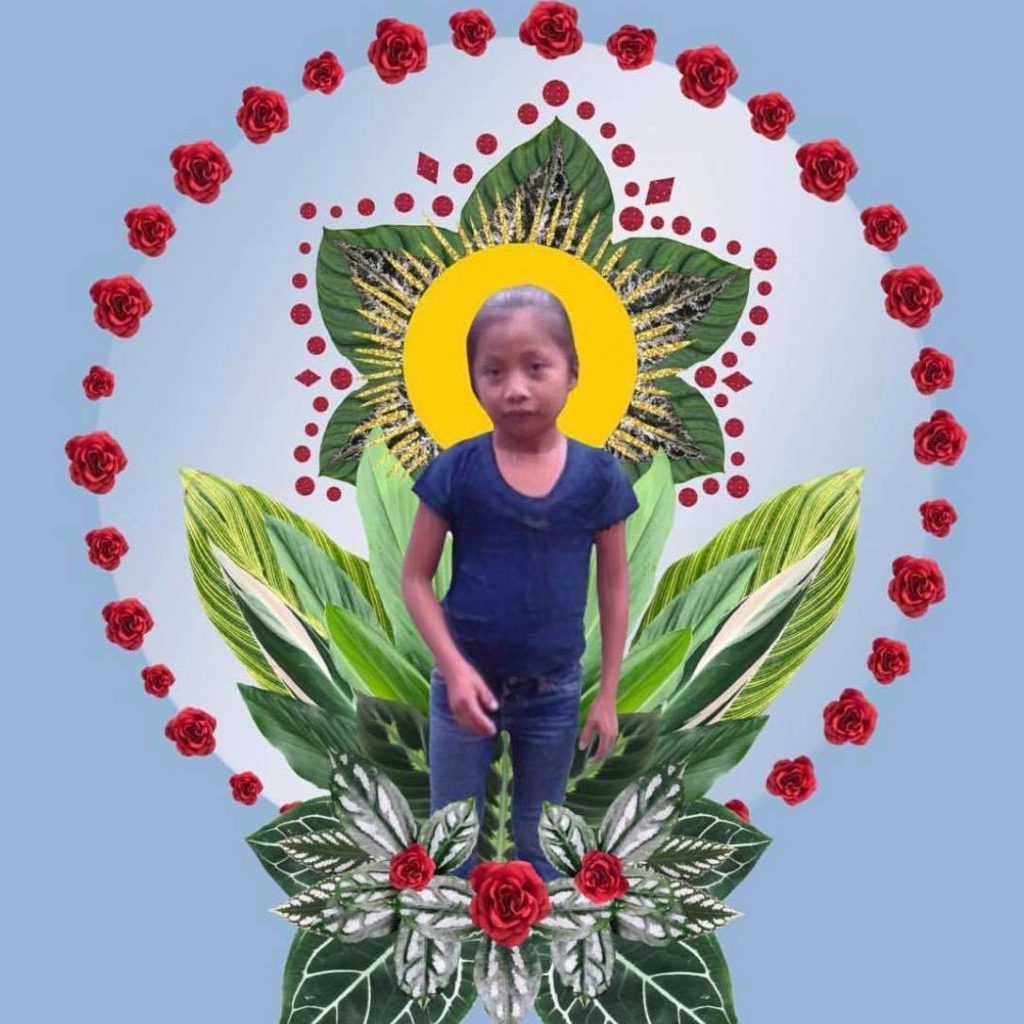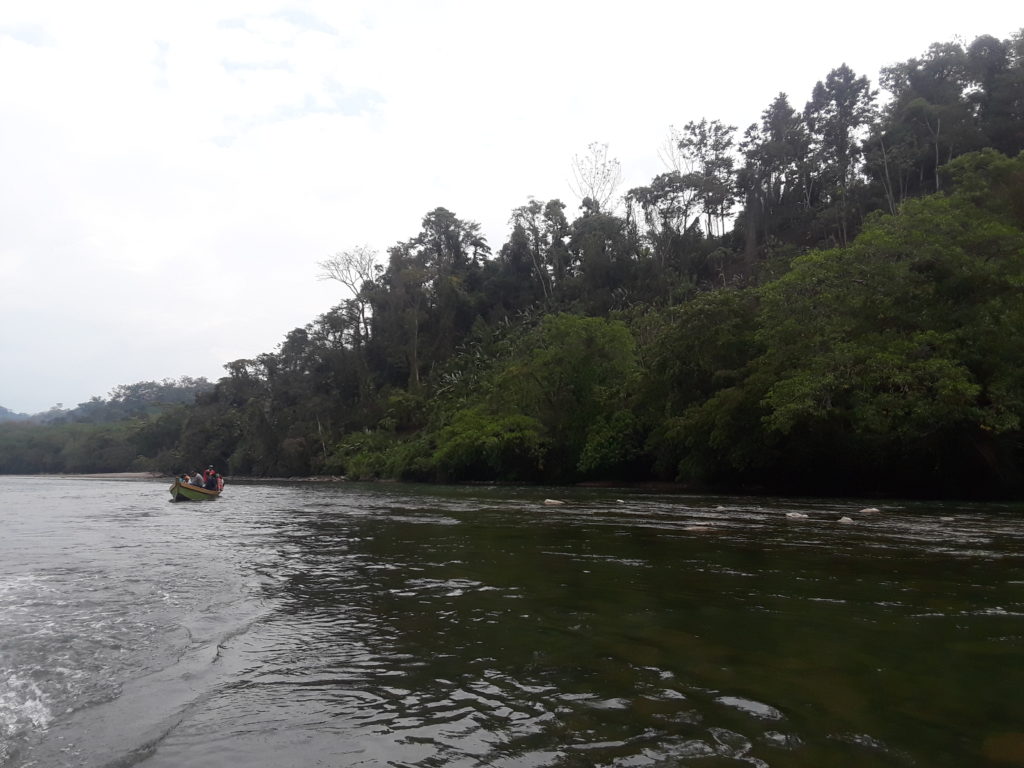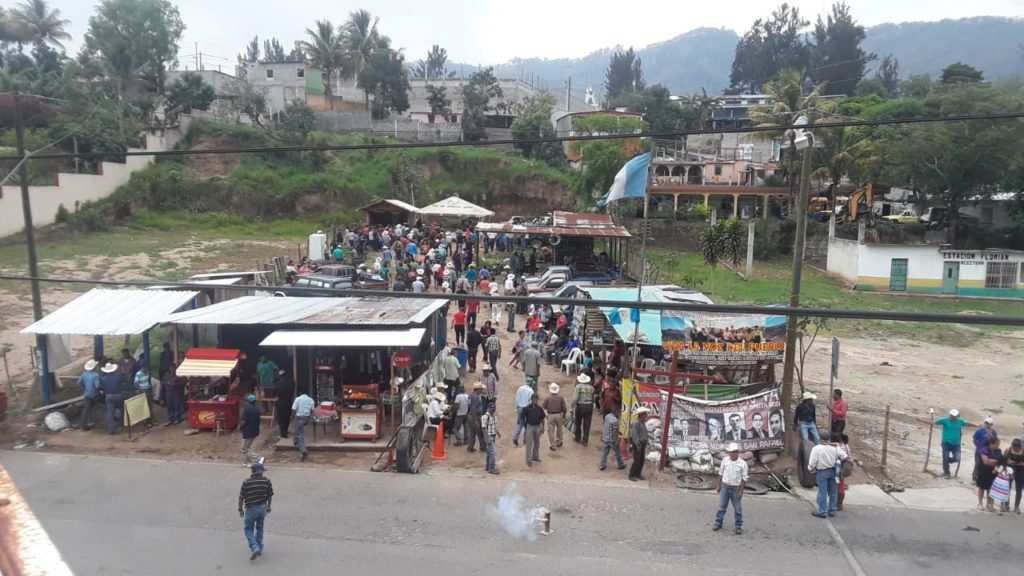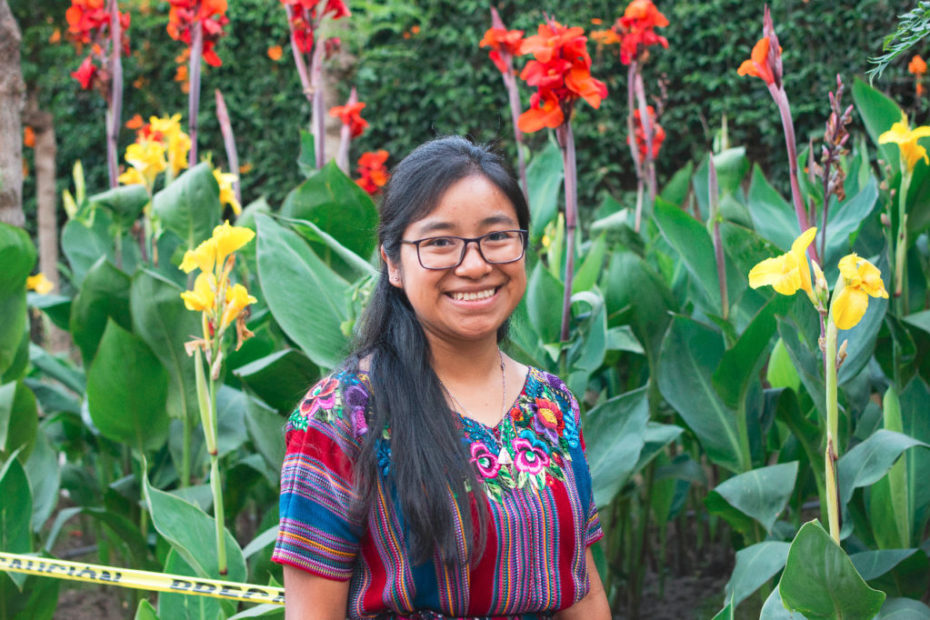Silvia Raquec, Migration Program Coordinator for Asociación Pop No’j, and NISGUA’s 2020 tour speaker.TAKE ACTION: NO SAFE THIRD COUNTRY AGREEMENTS WITH CENTRAL AMERICAWATCH THE WEBINAR! “ANCESTRAL MOVEMENTS: INDIGENOUS TERRITORIES AND MIGRATION”
Traducción Nisgua
In 2020, a new pandemic has invaded: COVID-19. The story isn’t new. 500 years ago, when the Spanish invaded Indigenous territories, they brought with them sicknesses that our peoples had never before seen. These illnesses caused even more deaths than the invaders’ own weapons.
The Petition of Sololá [also known as the Annals of the Kaqchikels] documents the story of the Kaqchikel people. It explains that with the Spanish invasion came illnesses such measles and smallpox, and other diseases to which the Original Peoples did not have biological defenses. Many, many people died.
Now, once again, the people who are most hit by the pandemic are the people who are most marginalized: poor people, women, Indigenous peoples, children, elders, queer people, disabled and chronically ill people, and others. Migrants are also among the most vulnerable as detention centers have inadequate conditions and deportaciones continue to countries where migrants may face danger or poverty. These conditions already put migrants’ lives in danger and do so even more under the pandemic.
There are also structural plagues, that have existed since the Spanish invasion. Structural plagues include the dispossession of Indigenous Peoples from their territories and identities, exploitation, racism, machismo or sexism, and the loss of respect for human life and Mother Nature. Historically, the dispossession of Indigenous Peoples has caused their displacement. However, the peoples of Abya Yala (the Kuna word for so-called South and North America) have resisted and continue to resist to this day by building alternatives.
With this framework, let us look at modern times through a specific example. Claudia Patricia Gómez González was a Maya Mam 20-year old woman from San Juan Ostuncalco, Quetzaltenango, Guatemala. Even though she achieved a a degree in accounting, she was forced to leave her home for lack of opportunities. Once she arrived in the U.S. in May 2018, a Border Patrol agent assassinated Claudia in Laredo, Texas.
Claudia’s assassinated is not a stand-alone example. Since December 2018, at least eight Indigenous Guatemalan children have died under the custody of Customs and Border Patrol (CBP).

Jakelin Ameí Rosmery Caal Maquin died on December 6 of septic shock, fever, and dehydration while in US Border Patrol custody. Artist credit: Ruben Guadalupe Marquez
The patriarchy is the system that controls all of the forms of oppression, exploitation, violence and discrimination that humans and nature live. The patriarchy has historically been constructed upon the bodies of women. This is to say that the domination of women is the same as the domination of nature; it is a relationship of inequality that is also seen in the oppression of certain peoples through colonialism, racism, sexism, and ageism. From this patriarchal perspective, both the earth and the bodies of women are conceived of as objects to sacrifice and conquer.
Lorena Cabnal, a Xinka community feminist, tells us that: “This body experiences a dispossession, an extraction, an imposition from another time, from another reality, from another interpretation…This body has experienced colonialism, and this language that I’m speaking today isn’t even my ancestral language, but the colonizing language.”
In order to discuss the idea of territory, one needs to start by talking about our bodies as the first territory. These bodies have been subjected to violence since the invasion and in war. These bodies have been taken and occupied, and they’re not just any bodies, but the bodies of women, which have been taken as loot of war in order to control peoples and territories. Our bodies have been together with the earth under constant threat and, currently, they are territories under dispute.
The struggle for the defense of land is inseparable from the defense of women’s bodies: the first territory to be liberated in a system that exploits them. It is necessary to make a more comprehensive defense of the right to make decisions regarding territory, body, and life. Only by uniting the struggles will we have the possibility to resist and create alternatives to transform the capitalist, patriarchal, colonial system.
Territory is not just dirt or the ground, but a living space in which a people develops itself and comes into being. It includes the earth, the water, the air, the subsoil, the fauna and flora, and all of the energies in a space. For Indigenous Peoples, territories are loq’olaj, a Maya word that translates to “sacred.” Territories are loq’olaj because they generate life, wellbeing, and provide food, cover, and shelter. Because of this, we conserve our territories in order to guarantee that future generations have the same existence. Also, territories have a historical and culture significance that provides identity and a sense of rootedness. This reality is expressed through practices such as burying the umbilical cords of babies in the land where they are born in order for the growth of deep roots from human to earth. It would be difficult for a nation without its territory to live and reproduce itself.

A boat filled with delegates and community members in the Chixoy River.
Because of all this, Mother Earth and our territories, including our bodies, are not “resources” to exploit and extract until they end. Instead, they are a space to exist within Mother Earth and with Mother Earth. Mother Earth for us is loq’olaj, a living being that has energy, a heart beat, that thinks and feels, and — because of this — deserves respect, care, protection, and reverence.
In Mayan cosmovision, the concepts of accumulation and hoarding do not exist. We take from our Mother only what we need for a full, simple, and happy life, and to guarantee the same opportunities for future generations. This is a value that the capitalist model doesn’t understand, has never respected, and continues to flagrantly violate with its savage extractive processes in the form of mining, big hydroelectric dams, logging, and monoculture.
The metal mining industry in Guatemala is mostly implemented in rural areas, where Indigenous people live. Hydroelectric projects only bring destruction and death. Transnational corporations make millions exploiting the resources that legitimately belong to Indigenous Peoples, leaving behind misery, pollution, corruption, and social division. They are racist and classist — they rape Mother Earth and want to destroy us as a people.
These activities, in addition to causing forced displacement, transform the logic of production, obligating those who had lived by farming and producing their own food to buy it instead. It drives them to look for work in other areas. The youth lose their knowledge of their own territories in the process.
Furthermore, [big corporations] do not consult the people so that they might be the ones who decide what happens to their territories. That is why we, the Indigenous Peoples, rise up in community struggles to defend our territories with the slogan: “YES TO LIFE!”
Some examples:
Since March of 2012, the Peaceful Resistance of La Puya, from San José del Golfo and San Pedro Ayampuc in the department of Guatemala, has fought the mining project El Tambor. The El Tambor mine is owned by U.S. company Kappes Cassiday & Associates (KCA), represented in Guatemala by Mining Explorations of Guatemala (EXMINGUA). The resistance succeeded in suspending the mine through the court system and now the company is under investigation in Guatemala for illegal exploitation of natural resources. On March 8th of this year, the community celebrated 8 years of peaceful resistance.
In El Estor, Izabal, the on-going activity of the Guatemalan Company of Nickel (CGN) and the Russian-Swiss company Solway has been worrying community members. COVID-19 is advancing and the company has not suspended its operations. There is a curfew but they continue transporting material to the plant and to Puerto Barrios. The workers are worried about the risk of infection. All of this is happening in spite of the Constitutional Court order from July 2019 that suspended the mining project Fénix, an order that the company did not comply with. We are seriously worried about the possibilities of further criminalization and militarization during these times.
Defenders of land, territory, and natural resources are criminalized, persecuted, incarcerated, and assassinated. UDEFEGUA registered that between January-June of 2017, people who defend the human right to a healthy environment (land, territory, and natural resources) suffered the most attacks, totaling 72 in that time period.
Facing this persecution and the plundering of the land, people are forced to leave their communities in order to protect their lives. The looting of lands to develop monoculture — like palm oil — and the presence of mining and big extractive companies are the causes of forced internal displacement and irregular international migration of people and communities. It should be noted that forced internal displacement is the prelude to international migration.
To cite some cases:
- Aura Lolita Chavez Ixcaquic, known as Lolita, is a womens’ rights activist and a Guatemalan Indigenous leader She is recognized internationally in the struggle to preserve and protect natural resources. She has received death threats in Guatemala. Because of this, she has been a refugee in the Basque country in Spain since 2017.
- Teresa Munoz, a community leader in Jalapa and opponent of Pan American Silver’s Escobal mine project, has been persecuted since May 2013 in San Rafael Las Flores and other municipalities around the Escobal mine. She is now a refugee living in the United States.
After pressure from community members of the affected municipalities and the complaints from the Center for Environmental and Social Legal Action (CALAS) that blame the mine for damaging houses in villages, the Supreme Court of Justice (CSJ) ordered the provisional suspension of the exploration and exploitation license of the Escobal and San Juan Bosco projects. The ruling signified the immediate suspension of operations, which have been halted since July 5, 2017. Although the company’s activity stopped, it had already left severe and irreparable damage. From 2012 to date, the inhabitants of La Cuchilla village have expressed fear of living in their homes because the damage is evident: cracked walls and floors. At the time of writing this report, about 80 families, some 300 people have left the community, which today is known as a ghost town.
The families of the displaced communities have lost their homes; the destruction of their houses, their harvests and other goods by security forces violate the residents’s property rights. Indigneous communities lose their connection to the land as well as their connection with the natural resources; they lose all enjoyment derived from their land and all land rights which is fundamentally needed to guarantee their survival and development.

Community members in resistance against the Escobal mine gather in the Peaceful Resistance of Casillas.
This is another root cause for migration in Guatemala. People don’t only migrate to improve their quality of life; not everything translates into money. People don’t leave because they want to. People are forced to leave: they leave to defend and save their lives. They leave because big companies have exacerbated all resources needed to survive in their territories and land.
We defend the right to migrate and not migrate. People should have the opportunity to decide where they want to be and to live and move freely. No one should feel obligated or forced to leave their house, their family, their community and their land.
Indigenous communities have always migrated and it’s never been a problem, it is seen more as an opportunity for exchange, of products, of communication: an exchange of cultures. In nature borders do not exist and this pandemic has demonstrated it: there are no borders, we are all part of the same human race.
Borders exist only in the minds of the people in power whose closed minds are infested with ambition. That same ambition makes them close down lands with physical murals, like if that stops people who have migrated for centuries. In fact, the term “migration” does not exist in Mayan languages, instead we reference the walker or the traveler.
As described in the the 9th Guiding Principle of the U.N., governments have a specific obligation to take protective measures against the displacement of Indigenous communities, minorities, farmers, pastors and other groups that have a special dependence to their land or a particular tie to it.
States must respect and promote the intrinsic rights of Indigenous communities, who derive from their political, economic, social and cultural structures, from their spiritual traditions, from their history and philosophy, and especially their right to their land, territories, and resources. It is necessary to that these human rights extend to compliance with norms related to Indigenous communities, in particular the ones established in ILO Convention 169, where land rights and independence of Indigenous communities are recognized.
Leaving your land under threat, forced by dire living conditions is a violation of life and security rights, just as established by the Constitution of the Republic of Guatemala.
Thus, the state of Guatemala turns into the first human rights violator by not guaranteeing the necessary conditions needed for people to not be forced to migrate. It is because of this that we can guarantee that Guatemala is NOT a “safe third country” when it isn’t even able to protect the life of its own Guatemalan citizens.
In July of 2019, Guatemala and the U.S. signed an Asylum Cooperation Agreement (ACA), also known as a “safe third country agreement”, under which the United States can deport migrants who are seeking asylum to Guatemala, where they then seek refuge. Similar agreements were also signed with Honduras and El Salvador. In these agreements, the U.S. denies refugees protection and violates international refugee law. Therefore, the U.S. must cancel these agreements.
Furthermore, we demand that the U.S. stop detaining migrants, as the conditions that they are exposed to in detention centers infringe on their security and their lives. Proof of this is the death of a Guatemalan asylum-seeker who died at a migration station in Tenosique, Tabasco. Migrants should be guaranteed access to health, even more so in this context of the pandemic.
That is why, in conjunction with NISGUA and other organizations, we are fighting to stop the regressive anti-migration policies of the United States government. As we have said, Guatemala is no “safe third country”; if it were, its population would not be forced to flee. The Asylum Cooperation Agreement (ACA) was signed behind the backs of the people, and it is not at all clear how it is going to work. Despite this, it is already being enforced to the detriment of the security, well-being, and lives of the people. We ask that you sign the petition to cancel the Asylum Cooperation Agreements (ACAs).
Asociación Pop No’j
Abril 2020
